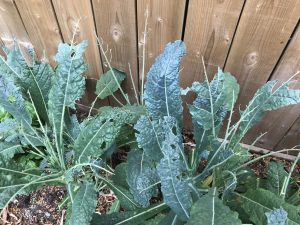
I live in north Toronto. Have 8 different kinds of herbs in my backyard garden and all are doing well BUT something is eating the kale really badly. See the attached pictures. Any idea what it is and how to control it???
Thanks in advance,
Bruce
Members of the Brassica family are very susceptible to insects. Holes appearing in the leaves of your kale certainly is an indication that you have a problem with some kind of insect. There are several types that love kale. Most likely, though, the culprits are caterpillars. You’ve probably noticed white butterflies around your garden. They are probably the cabbageworm moth or cabbage white butterfly. Adults lay eggs on the underside of the leaves on your kale. When the eggs hatch into light green larvae or caterpillars they’ll munch through your crop leaving holes in the leaves. These grubs are also referred to as cabbage loopers.
You obviously intend to eat this crop so you do not want to spray on anything toxic. Furthermore, by law in Ontario, you cannot use certain pesticides to kill weeds and insects in your garden for cosmetic purposes. For further details go to https://www.ontario.ca/page/pesticides-home-lawns-and-gardens.
These grubs are most active from dusk to dawn. A regular inspection of your plants in the evening and handpicking them and dropping them in soapy water can be quite effective. Bacillus Thuringiensis — also called Bt, is a bacteria that kills insects in their larval stage (such as caterpillars). There are several strains to choose from, depending on the pest you wish to control. You should be able to purchase Bt at any garden centre in the GTA. Make sure you read the instructions carefully. Bt must be ingested by the pest to work. This bacteria is a non-toxic, biological insecticide that will not harm any beneficial insects, including natural enemies of these worms.
If you have a lot of plants you may feel it’s worthwhile covering them with a lightweight fabric to prevent adult moths or butterflies from laying eggs.
Hopefully you will get to enjoy some of your kale.
Further resources:
https://extension.umd.edu/hgic/cabbage-looper-vegetables

